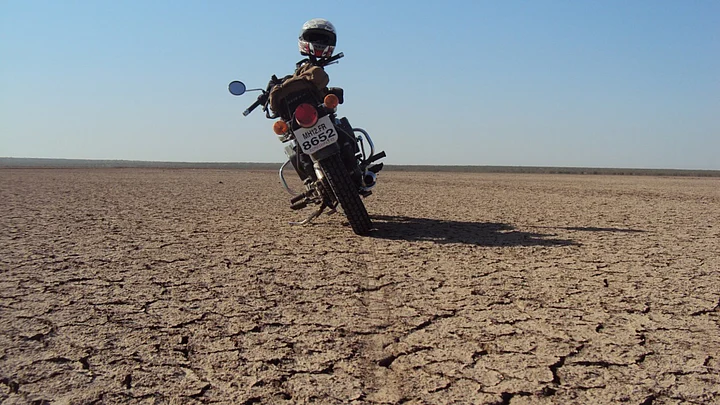That FIRST glimpse of the gleaming salt flats at the Rann of Kutch is a sight hard to forget. Speak to any biker and it’s a guarantee that he or she will start the story of the ride through the Rann with this imagery.
The opportunity to go full throttle on snowy white stretches that go on forever, is any adrenalin junkie’s dream – and that is what makes the Rann the new favourite destination for bikers.
It appears that 2013 was the year when bikers across the country woke up to the charms of the Rann. Buoyed by curiosity around the place, adventure companies like the Hindustan Motorcycling Company started regular rides. The past two years have witnessed a significant increase in the number of visits – some going there every year. You will find blog after blog on the internet, posted 2013-onwards, by biking clubs such as Royal Bikers and Bullet Battalion and solo riders like the Royal Enfield extolling the many virtues of this rugged terrain.
Bike to the Rann of Kutch For an “Exhilarating Sense of Freedom”
Perhaps it has something to do with the need to find unchartered terrains – instead of heading to the usual haunts like Ladakh, every year. Like one biker says:
After a while you are stuck in the same jams at the same places with the same groups year after year.
Rann helps break that monotony, and how!
“It offers a completely different terrain from the Himalayas and the southern trails. This is for the adventurous who love a good challenge,” says Pune-based engineer Arvind Singh. He first visited the Rann in 2011 with a biking group and intends to go there again, this time with his wife.
You are completely in sync with yourself. It’s (the bike journey to the Rann of Kutch) an exhilarating sense of freedom.Arvind Singh, engineer and avid biker
From a Biker’s Diary: Topographic Insights
The Rann is divided into two parts: the Greater Rann, close to the Indo-Pak border and the Little Rann. Bikers usually start their trip from Gandhidham and wind their way through the salt flats, the white desert of Dhordo and move on to Lakhpat where a solitary fort stands vigil.
Some go onto the beach town of Mandvi, with its quaint shipbuilding yard, ending their journey in the heart of Bhuj. History buffs also keep some time aside for Dholavira, an archaeological site of a major Harappan city.
To satiate the patriot in you, one can even visit the security post at the Indo-Pak border, but one needs to get permits in advance. “The western-most part of the Rann is still unexplored and holds a great attraction for bikers,” says Surat-based Ravi Bhatia, president of the Bullet Battalion club. He was part of the group’s yearly ride to Kutch in 2013.
It is advisable to embark on a bike trip to the Rann only after March as, prior to March, the salt at the Little Rann is still wet and your bike could get stuck in cesspools of soaked sand. As summer dawns, the moisture evaporates quickly to reveal a sparkling surface, which allows a bike to achieve high speeds. But it’s imperative to maintain balance to avoid wet patches and thorns.
White Sands and Night Skies: Here’s Why the Rann Will Call You Back
The Rann is as deceptive as it is beautiful. Confusing mirages pop up unexpectedly and temperatures can soar to as high as 50 degree centigrade in the summer.
All you can see in the rear view mirror is dust. Due to the mirage effect, you can hear your friends’ bikes pumping but can’t see them. It’s imperative to have GPS to track people down.Arvind Singh, engineer and avid biker
Also, there is no petrol station after Ahmedabad, so it’s essential to have a full tank and carry spare tubes to take care of the inevitable punctures caused by thorny tracks.
But it’s all worth it! Singh remembers entering the Little Rann on a full moon night once. The rich colours of white and blue gleaming off the salt flats are seared in his memory.
And then there are those who jump at the rare glimpse of a wild ass in the wilderness.
Clearly, each trip to the Rann means something different for a different person. You must make your own.
(Avantika Bhuyan is a freelance journalist who loves to uncover the invisible India hiding in nooks and crannies across the country)
(This travel season The Quint reposts this piece from our archives, originally published on 8 August 2015.)
